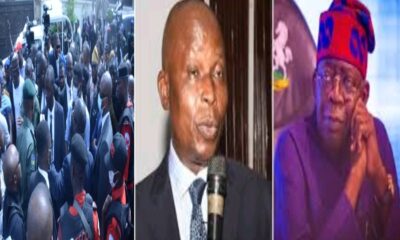Global Issues
Greece – A Lesson for Leadership -By Taiwo Odukoya

It is said that Greece’ leaders, for three decades, borrowed and borrowed to finance systems and patterns of unproductivity and waste. They kept increasing the size of the public sector by promising jobs in exchange for votes. The result was a series of unsustainable budget deficits that submerged succeeding generations in debts that have kept them at the mercy of their creditors.
A good man leaves an inheritance to his children’s children… (Proverbs 13:22)
In the last one month the Greeks have dominated global news headlines for no good reason. The historical nation, often referred to as the cradle of European civilisation, is on the precipice of economic collapse. At the time of writing this piece, its banks were closed. Pensioners were stranded. Unemployment was at an all time high, and its creditors had further imposed strict austerity measures it had no other option but to accept. Crisis becomes Greece.
It is interesting to note, however, that in 1981 when Greece joined the European Communities, now the European Union, it had huge investments in infrastructure and industrial enterprise with swelling revenues from tourism, shipping and a growing service sector. The big question is, what happened? The rather complex answers serve vital lessons for leadership, particularly in today’s unstable economic environment, where projections and planning for the future have become key indices for determining a sound economic model. In other words, leadership today is defined by its ability to build a sustainable environment that allows for progress and prosperity.
It is said that Greece’ leaders, for three decades, borrowed and borrowed to finance systems and patterns of unproductivity and waste. They kept increasing the size of the public sector by promising jobs in exchange for votes. The result was a series of unsustainable budget deficits that submerged succeeding generations in debts that have kept them at the mercy of their creditors.
…our prayers are with the current government to do something totally different from the seeming status quo of waste and the style of “many activities without progress.” It is time to begin to get serious, becoming more proactive and thinking more in terms of the future generation.
The case of Nigeria is pretty similar, particularly with the past governments. It was in the time of Gowon that, apart from fighting a civil war, Nigeria built most of the existing infrastructure, which would mean that most of our infrastructure are almost as old as fifty years. Most of the succeeding governments after Gowon, however, went shopping for money to borrow. The result was unusual debt pile up, no added meaningful infrastructure to what already existed, a nonchalant approach to maintenance, and continued degradation of existing structures. The climax is that Nigeria today cannot pay salaries. What an unfortunate situation.
In 1990, the government of Norway established The Petroleum Fund of Norway, a sovereign wealth fund with the purpose of saving and investing the surplus generated from the country’s petroleum sector for future generations. As at 2014 the fund stood at $857.1billion and is forecasted to reach $1trillion by 2019, insulating it from shocks to the global oil market.
One or two spirited governments have made such moves in the past. By this I mean the setting up of the Petroleum Trust Fund and the surplus of crude oil sales which culminated in what is referred to as the Excess Crude Account. Only for succeeding governments to destroy the delicate foundation they laid. So our prayers are with the current government to do something totally different from the seeming status quo of waste and the style of “many activities without progress.” It is time to begin to get serious, becoming more proactive and thinking more in terms of the future generation. As John Allston said, “The only thing you take with you when you’re gone is what you leave behind.”
NIGERIA HAS A GREAT FUTURE





















